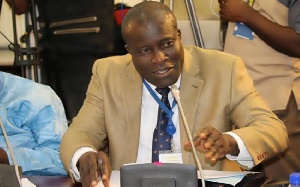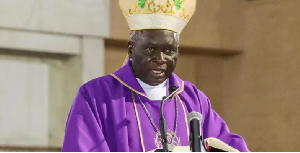Government is planning to introduce electric buses and buses fuelled with Compressed Natural Gas (CNG), to reduce the emission of pollutants into the environment, as part of climate change actions.
The introduction of these environmentally-friendly buses, into the public transport system, is envisaged to gradually phase-out the use of diesel-powered urban buses within the short to medium term and the long term.
Deputy Minister of Transport, Danny Titus Glover, who disclosed this said the government was collaborating with the African Development Bank (AfDB) to aid it to access funds from the Green Climate Fund for the purchase of the electric buses.
He was speaking on Wednesday at a roundtable discussion on Ghana’s Nationally Determined Contributions (NDCs) to address climate change at the ongoing African Climate Week in Accra.
The NDCs are national climate action plans developed in line with the 2015 Paris Agreement on climate change. They are 31 targets that cut across sectors such as transport and energy and are to be implemented from 2020 to 2030.
The discussion, on the theme, “Investing in climate actions for job creation and economic development,” centred on progress made on the implementation of the NDCs and investment opportunities that come with them.
“Electric Mobility is a promising technological solution to addressing climate pollutants, and we call on investors and interested parties to partner the government in rolling out this very important initiative,” he said.
Mr Glover said there were a number of collaborations with the Environmental Protection Agency with support from the UN Environment in the development of key policy papers to guide investment decisions including the Soot-free Urban Bus Policy and Electric Mobility Policy options for Ghana.
Additionally, he pointed out that there were some collaboration to introduce vehicle emissions standards with the regulations being developed for consideration.
Explaining the need for environment-friendly buses, Mr Glover said the road transport sector accounted for about 45 per cent of total fuel combustion emissions and 13 per cent of the overall National Greenhouse Gas emissions in 2016.
This, he said, was dangerous to health since studies had estimated that the average Ghanaians spent about eight years of his or her life in traffic in the midst of the emissions, adding that the government was working on other interventions in the transport sector to help address climate change.
The Director of the Climate and Green Growth Department of African Development Bank Group, Dr Anthony Okon Nyong, confirmed its collaboration with Ghana on the introduction of the electric buses.
“We are keen to support electrical bus system. There are other projects that we are keen to support because we want to ensure that Ghana continues to take the lead that it has done” he stated.
General News of Friday, 22 March 2019
Source: ghanaiantimes.com.gh

















